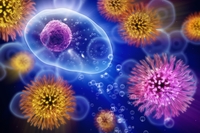In the same section
-
Share this page
EOS research project "MODEL-IDI"
MOlecular mechanisms of cellular DEath and Life decisions in Inflammation, Degeneration and Infection
 Necrosis and apoptosis are two distinct modes of cell death. These natural processes may result in tissue damage, as cell death can act as an initiator or amplifier of tissue destruction and/or inflammation. The underlying hypothesis of the “MODEL-IDI” project is that the disruption of certain cell death checkpoints could be linked to the onset or progression of different inflammatory/degenerative pathologies.
Necrosis and apoptosis are two distinct modes of cell death. These natural processes may result in tissue damage, as cell death can act as an initiator or amplifier of tissue destruction and/or inflammation. The underlying hypothesis of the “MODEL-IDI” project is that the disruption of certain cell death checkpoints could be linked to the onset or progression of different inflammatory/degenerative pathologies.“MODEL-IDI” aims at performing fundamental research – from biochemistry and cell biology to organism level – on the biology of cell death modalities, cell survival regulation and their consequences on the onset/progression of diseases such as diabetes, neurodegenerative diseases, hepatotoxicity and liver cancer. MODEL-IDI will also investigate the role of circadian rhythms in the regulation of cell death and inflammation in diabetes. The program aims at repurposing existing drugs for their ability to inhibit apoptosis and necroptosis and will also optimize new tool compounds affecting the above-mentioned processes by medicinal chemistry.
Research partners are based in Universiteit Antwerpen, Universiteit Gent (coordinator), Université de Liège, University of Lisbon, Deutsches Krebsforschungszentrum and ULB (Alessandra K. Cardozo, ULB- Center for Diabetes Research, Faculty of Medicine) – focusing on both type 1 and type 2 diabetes.
Dates
Created on August 13, 2018
